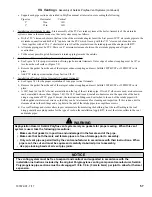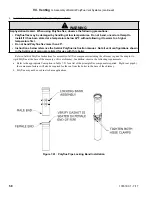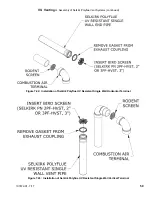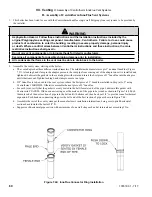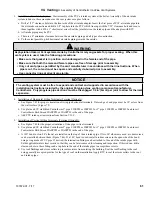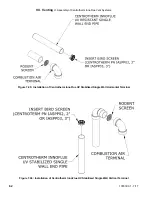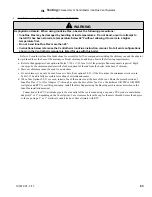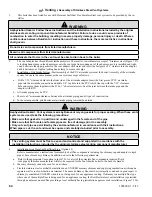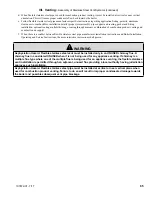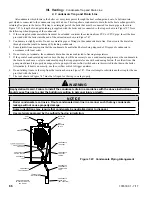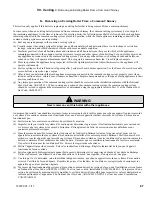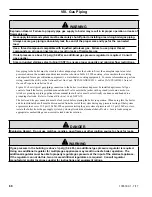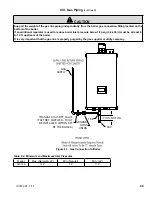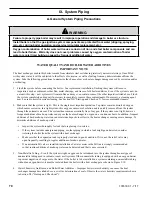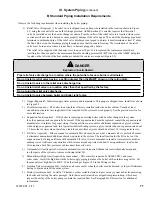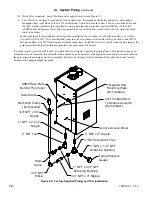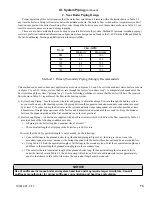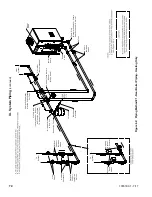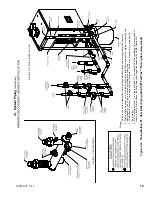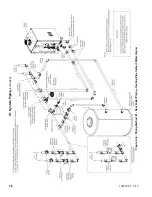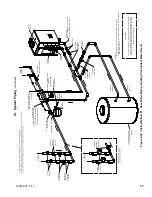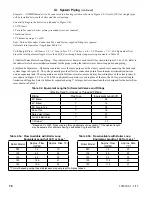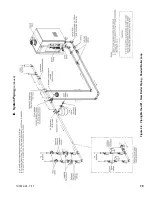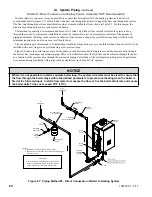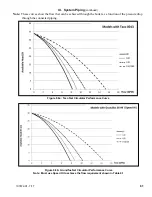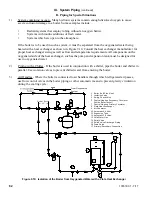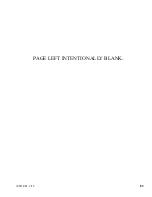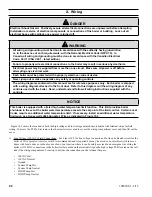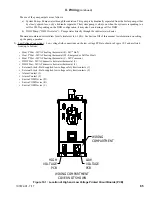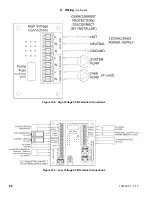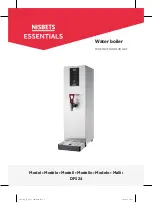
71
107672-01- 7/17
IX. System Piping
(continued)
DANGER
Explosion / Scald Hazard.
Pipe relief valve discharge to a location where the potential of severe burns is eliminated.
Do not install a relief valve having a setting greater than the MAWP shown on the rating plate.
Do not install a valve in the relief valve discharge line.
Do not install relief valve in a location other than that specified by the factory.
Do not plug the relief valve discharge.
Do not install a valve between boiler and boiler relief valve.
2) Gauge (Required) - Indicates supply water pressure and temperature. This gauge is shipped loose. Install it as shown
in Figure 9.9.
3) Circulator (required) – The boiler loop circulator is factory installed inside the boiler cabinet. Usually at least
one addition circulator (not supplied) will be required for the system to work properly. See the previous section for
more
information.
4) Expansion Tank (required) – If this boiler is replacing an existing boiler with no other changes in the system,
the old expansion tank can generally be reused. If the expansion tank must be replaced, consult the expansion tank
manufacturer’s literature for proper sizing. If using antifreeze, account for additional expansion of glycol solution
when sizing an expansion tank. In a typical residential heating system, a glycol mixture has an expansion rate about
1.2 times that of water alone, therefore a tank for an anti-freeze system should be at least 1.2 times greater in size.
5) Fill Valve (required) – Either a manual or automatic fill valve may be used, but a manual valve is preferred because
it eliminates unmonitored additions of make-up water to the system. The ideal location for the fill valve is at the
expansion tank. If using antifreeze with automatic fill valve, it is recommended to install a water meter to monitor
makeup water. Antifreeze concentration will decrease as makeup water is added. If using antifreeze, local codes
often require a backflow preventer or disconnect from city water.
6) Automatic Air Vent (required) – At least one automatic air vent is required. Manual air vents will usually be required
in other parts of the system to remove air during initial fill.
7) Manual Reset High Limit (required by some codes) - This control is required by ASME CSD-1 and some
other codes. Install the high limit in the boiler supply piping just above the boiler with no intervening valves. Set
the manual reset high limit to 200°F. Wire the limit per Figure 10.3 in the Wiring section.
8) Isolation Valves (recommended) - Isolation valves are useful when the boiler must be drained, as they will eliminate
having to drain and refill the entire system.
9) Strainer (recommended) – Install a Y Strainer, or other suitable strainer, to prevent any system debris from entering
the boiler and fouling the water passages. Note that some strainers have a significant pressure drop, which may
impact the ability of the boiler pump to obtain the required flow. See Paragraph B of this section for additional
information.
B. Standard Piping Installation Requirements
Observe the following requirements when installing the boiler piping:
1) Relief Valve (Required) – The relief valve is shipped loose and must be installed in the location shown in Figure
9.9, using the side outlet Tee and other fittings provided. ASME Section IV currently requires that this relief
valve be installed above the heat exchanger as shown. Pipe the outlet of the relief valve to a location where water
or stream will not create a hazard or cause property damage if the valve opens. The end of the discharge pipe must
terminate in unthreaded pipe. If the relief valve discharge is not piped to a drain, it must terminate at least 6” above
the floor. Do not run the discharge piping through an area that is prone to freezing. The termination of the relief
valve must be in an area where it is not likely to become plugged by debris.
The relief valve supplied with the boiler is set to open at 30 psi. If it is replaced, the replacement must have
a setting less than or equal to the maximum allowable working pressure (MAWP) shown on the ASME data plate
located on the left side of the heat exchanger behind the service access panel (Figure 9.9).
Summary of Contents for K2WT-080B
Page 83: ...83 107672 01 7 17 PAGE LEFT INTENTIONALLY BLANK...
Page 89: ...89 107672 01 7 17 X Wiring continued Figure 10 5 Internal Ladder Diagram...
Page 90: ...90 107672 01 7 17 X Wiring continued...
Page 91: ...91 107672 01 7 17 Figure 10 6 Internal Wiring Connections Diagram X Wiring continued...
Page 102: ...102 107672 01 7 17 Lighting and Operating Instructions XI Start Up and Checkout continued...
Page 147: ...147 107672 01 7 17 XV Service Parts continued...
Page 151: ...151 107672 01 7 17 XV Service Parts continued...
Page 153: ...153 107672 01 7 17 XV Service Parts continued 85 86 91 95...
Page 162: ...162 107672 01 7 17...
Page 163: ...163 107672 01 7 17...
Page 164: ...164 107672 01 7 17...
Page 165: ...165 107672 01 7 17...
Page 166: ...166 107672 01 7 17...
Page 167: ...167 107672 01 7 17...

